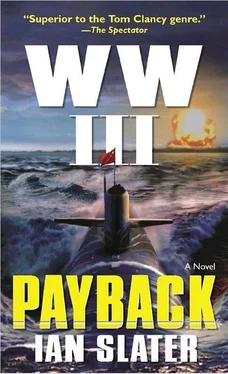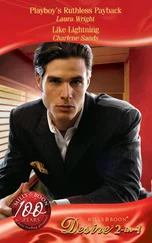Having cleared the SAW’s jam, Bone Brady, the gaping wound in his left shoulder not bleeding as profusely as he would have expected, was nevertheless in terrible agony. The pain had been there all the time but had been temporarily overridden by the surge of adrenaline he’d needed fighting the now-dead North Korean sergeant. Pulling out a morphine “jab,” he thrust it into his thigh, cradling his injured arm inside his battle tunic, his wide fireman-issue suspenders serving as an immobilizing strap. He’d no sooner clipped one of his six unused “feed boxes” of 5.56mm ammunition onto the SAW than he heard the sound of trucks coming south from Kosong, toward the warehouse. Soon slit headlights were faintly visible in the downpour, the rain so cold he was beginning to shiver, the body heat of his life-and-death struggle with the stocky little Korean sergeant now replaced by what he felt was approaching hypothermia. In the euphoric rush of the painkilling morphine, he had no time to realize how the freezing rain had probably saved his life, the resulting vasoconstriction stemming the flow of blood from his wound.
The roar of a motorcycle and sidecar caught him off guard as its lumpy infrared blob in his goggles slid over the summit of the hill barely three hundred yards to his right, beyond the northern end of the warehouse. From the 3-D computer SATPIX mock-up of Beach 5, the warehouse, and environs, Bone had expected to see any newly approaching traffic as quickly as he’d spotted the NKA sergeant’s jeep, but the motorcycle and machine-gun-mounted sidecar combo had no headlamp, and he would have missed it altogether had it not been for the high-intensity “strobe” flare stuttering away to the east, casting the warehouse and the robotlike figures of the combatants caught moving around it in a macabre, bluish white light. But the motorbike combo driver and gunner saw him too, and opened fire. Woozy from his wound and the morphine, Bone was a second late, but here again the North Koreans had come up against one of Freeman’s crème de la crème — the men whom he so dubbed knowing that first to fire didn’t necessarily win the day. The warrior who won, no matter how outnumbered, was the man who fired for effect, this discipline imposed upon him not by his commander nor even by his will, but by the mundane, finite supply of ammunition and provisions he carried, from the time of the Grecian phalanx to the war against terror. It was a truth that terrorists, from those who had come up against Freeman’s trained men in Afghanistan to those operating as far away as the Arctic, were learning as they came into contact with the painful reality of American and British SpecFor firepower.
As quickly as the firefight inside the warehouse had begun, it ended. “ Hwang bok A-ni meun jun neun da! — It’s surrender or death. Now!” shouted Freeman in the Korean phrase that Johnny Lee had taught him. The general’s announcement, so faultless in its syntax, so loud and commanding in its tone, cut through the cacophony of battle like a salvo from a man-o’-war, and almost blasted Salvini’s earpiece apart.
The general’s ultimatum was immediately supported by an awesomely concerted barrage from his team, whose automatic, shotgun, and grenade fire was orchestrated via mike with Salvini and Lee, and was so fiercely well aimed, killing at least a third of the remaining defenders, that it convinced enough of the North Koreans that it was indeed either surrender or death. After a few desultory shots from the direction of the long boxes Freeman had glimpsed earlier, he could see a white cloth being waved frantically side to side in the middle of the warehouse. The flag of surrender was difficult for Aussie to see, given the pall of dirty white fog in his NVGs as the heat and acrid reek of cordite rose into the air and made eyes water to the point that Choir Williams almost felt obliged to don his gas mask. He thanked God and the stunning surprise of their attack for not necessitating its use earlier, the NKA having no time to use tear-gas canisters, which in the enclosed environment would have been as much, if not more, a difficulty for them as for the Americans.
But if it was over in the warehouse, as Johnny Lee concurred with Freeman, this wasn’t the case on the coast road. Bone Brady’s squad automatic weapon, though taking out the motorcycle and sidecar combo with one accurate burst as opposed to the NKA machine gunners’ wildly inaccurate spraying, became so hot firing at the ensuing three-truck convoy, taking out two of the half-ton Chinese-style vehicles, that the SAW was steaming in the rain and he had to change to the backup barrel. He made the switch in under three seconds, a remarkable achievement, given the appalling weather and his injury, but it wasn’t fast enough to stop the third truck.
Unlike the first two, which had burst into flames, sending their occupants, many engulfed by the gas tanks’ explosions, fleeing into the rain-soaked brush, this third truck, though stopped, was discharging its unharmed occupants. Through his NVGs Bone saw at least twenty heavily armed NKA regulars spilling out of the truck, down into the road’s drainage ditch, so that now the truck formed a barricade between them and Bone twenty yards away across the road. By now he was coming under incessant rifle fire, added to now and then by the telltale rattle of AK-47s and what sounded like several more up-to-date AK-74s.
“Aussie!” shouted the general, “go help Bone. Back here in five. We have eight minutes.”
“Back in five!” confirmed Aussie, clipping a fresh thirty-round mag into his HK MP5, grabbing Choir’s SEMTEX parcel with his left hand, his HK in his right, then hightailing it through the length of the warehouse, leaping over several bullet-popped ammunition boxes, which seconds before had constituted the NKA’s “city wall.” The flashes of white streaking past him were the body heat from the defeated defenders of the warehouse who, under shouted directions from Choir Williams, Lee, and Salvini, were throwing down their weapons. The clattering of their discarded steel sent a medieval-like ring through the huge, prefabricated warehouse, which, ironically, Freeman discovered on noticing the imprint of a U.S. Marine I-beam during the careful but fast surrender, had been built by the U.S. Army’s Corps of Engineers for the South Koreans before the Korean War had ended and the DMZ line was drawn farther south.
For all their expertise in assembling and disassembling any firearm known to man, Choir and Salvini, who had the job of deactivating the North Koreans’ weapons while the general and Johnny Lee ordered their prisoners to remove their boots, didn’t have sufficient time to spike every single NKA weapon.
“Seven minutes!” shouted the general, who now rapidly distributed his pancake-sized lumps of SEMTEX among the growing pile of surrendered weapons, which included several of the rocket-propelled grenade launchers and the prisoners’ boots. He then stuck multiple short lengths of ten-second det cord into the pancakes of plastique, as Johnny Lee herded the single line of bootless POWs, about fourteen in all, out of the warehouse via the southern door, after which he told them that they had ten seconds to run the last few yards of the Y’s left fork and to cross the road. “After that,” he told them, “ Da ssa bo ryo —we’ll open fire.” As he hustled the last of the prisoners out the door, his voice took on a wry tone, a habit he’d picked up from Aussie Lewis and the Welshman Choir. “ Kochang-kapshida —Please go straight!” he said.
The prisoners needed no encouragement, for already they were quickly, if awkwardly, making their way along the last few yards of the gravel pathway toward the road’s shoulder at the top of the Y, which they scampered up, several slipping on the shoulder’s rain-slicked slope until they got to the road, Lee informing Bone and Aussie via his throat mike not to fire on them, as they were unarmed and now bootless, which was evident when they began to cross the badly potholed coast road. Unused to traveling barefoot, they were hopping about in the rain like apprentice firewalkers. Never had one of the best-equipped armies in Asia been so disabled, driving home the fact to Johnny Lee how once again Freeman had proved worthy of his legendary status in the history of American arms. Having experienced the same humiliation himself during a South Asian mission years before, he had subsequently made it a fail/pass test for any of his SpecFor members. If you couldn’t hump a regular combat pack of seventy pounds, the same weight that the Grecian hoplites in the age of Troy had had to carry into battle, for twenty miles, in bare or “stockinged feet,” as the SAS boys in Wales put it, you could not be a member of a Freeman team.
Читать дальше












